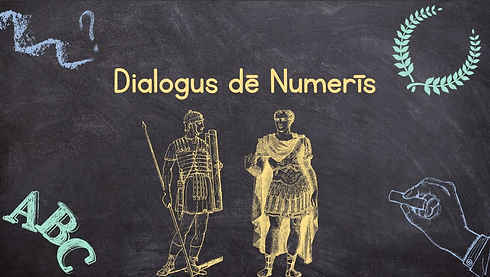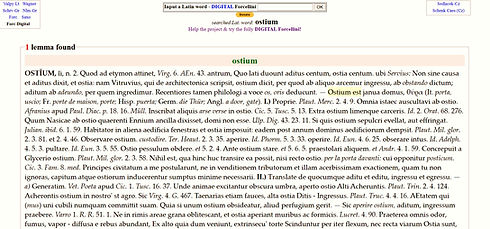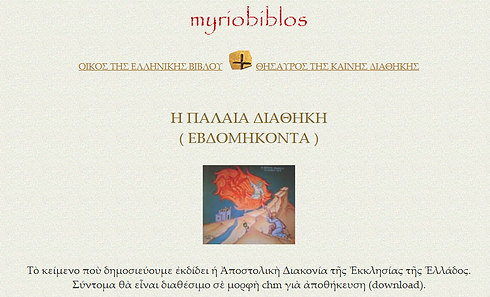Lectiones Antiquae
Ἐν γράμμασι καλόν

Tutorials

Dialogus de Numeris is a dialogue between a Roman commander and one of his soldiers, Ariovistus, who is of Germanic origin. The conversation covers topics such as cardinal, ordinal, and distributive numbers and adjectives, as well as fractions, offering an almost exhaustive explanation of each. Different systems of numerical notation are also discussed throughout the dialogue.
My audiobooks
I do not use any kind of IA in my audiobooks. I remove all saliva and breath noises manually using Adobe Audition CC.
I do not charge for their download anymore, so feel free to download them from Youtube. However, please consider making a donation and leaving a suggestion to support my work.
I do not allow the use of my voice anywhere without credits. If the credits are given, use it as you wish.
Youtube channels
*As I find other interesting channels, they shall be added to this list.

Onagrus provides the reading of texts from Classical, Hellenistic, Medieval, Renaissance, and Modern eras. Following the long-lived tradition of Western scholars, he provides textual notes in Latin! Beginners will benefit from his reader series as well as from his videos on Greek and Latin verbs and proverbs!
ScorpioMartianus is the largest YouTube channel dedicated to Latin and Ancient Greek. Its creator, Luke Ranieri, has long devoted himself to using these languages as living, spoken tongues. Explore his playlists to discover the wide variety of themes he has covered so far, and you’ll also benefit greatly from his other channel, Polymathy!


The Polis Institute is dedicated to the active study and teaching of ancient and modern languages. Its efforts are focused on bringing Latin, Ancient Greek, and Hebrew to life as spoken languages. The Institute has also made a number of Ancient Greek audiobooks—using reconstructed pronunciation—freely available to the public!

LiantinisORG is dedicated to the life and work of Dimitris Liantinis, the Greek philosopher and associate professor at the Department of Pedagogy in the Faculty of Philosophy, Pedagogy, and Psychology at the University of Athens. Deeply influenced by Ancient Greek thought and the writings of Nietzsche, Liantinis left behind profound reflections on morality, death, and the human condition.
Dr. Justin Sledge, Esoterica's creator, explores Western esoteric traditions, philosophy, mysticism, and the history of religion, all presented from a scholarly perspective. The channel offers rich insights into topics such as Hermeticism, Kabbalah, alchemy, and Christian mysticism, as well as into the works of thinkers like Marsilio Ficino, Cornelius Agrippa, Giordano Bruno, and many others!

Disclaimer: I do not necessarily endorse any personal opinions on politics, philosophy, or theology that may be expressed in these channels’ videos. I am sharing them solely for their informational value and the reflections they bring us.
Dictionaries and Grammars

The Lexicon Totius Latinitatis by Egidio Forcellini is one of the most comprehensive Latin dictionaries ever compiled. First published in the 18th century, it meticulously documents the vocabulary, usage, and historical development of Latin from its earliest inscriptions to the Late Antique period. It is a useful tool for those to learn how to talk about Latin words in Latin.
Allen and Greenough Latin Grammar is one of the most respected and comprehensive reference grammars for Classical Latin, widely used by students and scholars across the English-speaking world for over a century. It is renowned for its depth, clarity, and systematic organization, covering the entire range of Latin language mechanics.

Rhetoric, along with Philosophy and Poetry (though the latter two do not exclude the art of eloquence), was among the most important sciences in both Greece and Rome, especially in those regions and periods where speech was not suppressed by political power. Silva Rhetoricae is an excellent tool for learning the names of rhetorical figures and for recognizing their use and function when reading eloquent authors.

Online libraries

TheLatinLibrary, founded by William L. Carey, is a long-established free online collection of Latin texts spanning from Classical, through Medieval, to Christian and later Latin authors. While it doesn’t provide modern critical editions, translation tools, or editorial notes, it is extremely useful for accessing many texts quickly and directly — especially for reading and reference.
Documenta Catholica Omnia is a comprehensive digital library that gathers and preserves a vast collection of texts related to the history, theology, philosophy, and culture of the Catholic tradition. It includes writings from the Church Fathers, councils, popes, theologians, and scholars from antiquity to modern times.


Augustinus.it gathers and preserves the complete works of St. Augustine, not only in their original Latin, but also in Italian, English, Spanish, French, and German translations. It is a valuable resource for those who wish to use translations as an aid while becoming familiar with St. Augustine’s style.

















